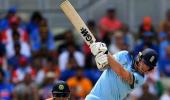Looking to resume training for local players, the Cricket Association of Bengal on Friday recommended a ban on the use of saliva and sweat on the ball keeping in mind the high risk of transmitting the coronavirus.
The International Cricket Council has recommended a ban on saliva to minimise the risk of infection and the CAB has gone a step further, banning the use of sweat too, following the advice of its medical committee.
"Restriction of using saliva as well as sweat on the balls for the time being during practice was suggested," the CAB stated in a media statement.
 Image used for representational purposes. Photograph: PTI/Files
Image used for representational purposes. Photograph: PTI/Files"Protocols and precautions to be adopted for training were discussed in details. The ICC guidelines were referred to. It was decided that a manual stating do's and dont's would be prepared for easier understanding at the earliest."
"Training should initially resume for small groups so that social distancing norms could be met."
A 10-point draft was prepared by the medical committee and CAB president Avishek Dalmiya said they would make all efforts to ensure they are conducted safely.
The CAB would also have an isolation room reserved for emergency situation.
Bengal cricket selector tests positive for COVID-19
Bengal selector Sagarmoy Sensharma has tested positive for COVID-19, Cricket Association of Bengal President Avishek Dalmiya said on Friday.
A member of their 1989-90 Ranji Trophy winning squad, the former Bengal pacer Sensharma is learnt to have contracted the coronavirus from his wife.
Confirming this, Dalmiya told PTI: "His wife was first tested positive for COVID-19 and after she recovered, Sagarmoyda has tested positive. But his rest of the family members have tested negative. The CAB has cleared his all his dues."
The 54-year-old has been admitted to a private hospital on EM Bypass.
West Bengal on Thursday had registered the biggest one-day spike with 344 people testing positive for COVID-19, taking the total number of confirmed cases to 4,536.
As many as 223 people have succumbed to the disease in the state so far.
Earlier, the state government had attributed the death of 72 coronavirus patients to co-morbidity.











